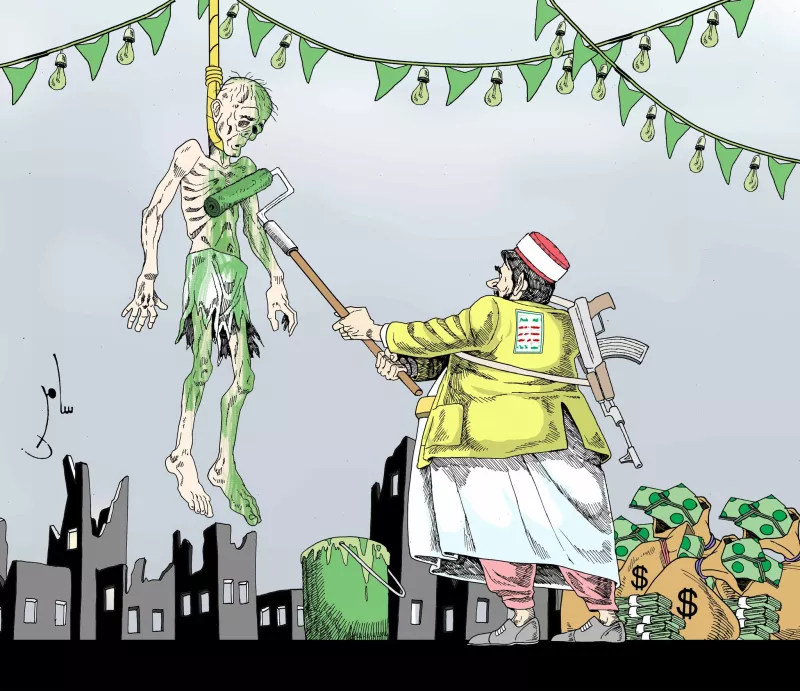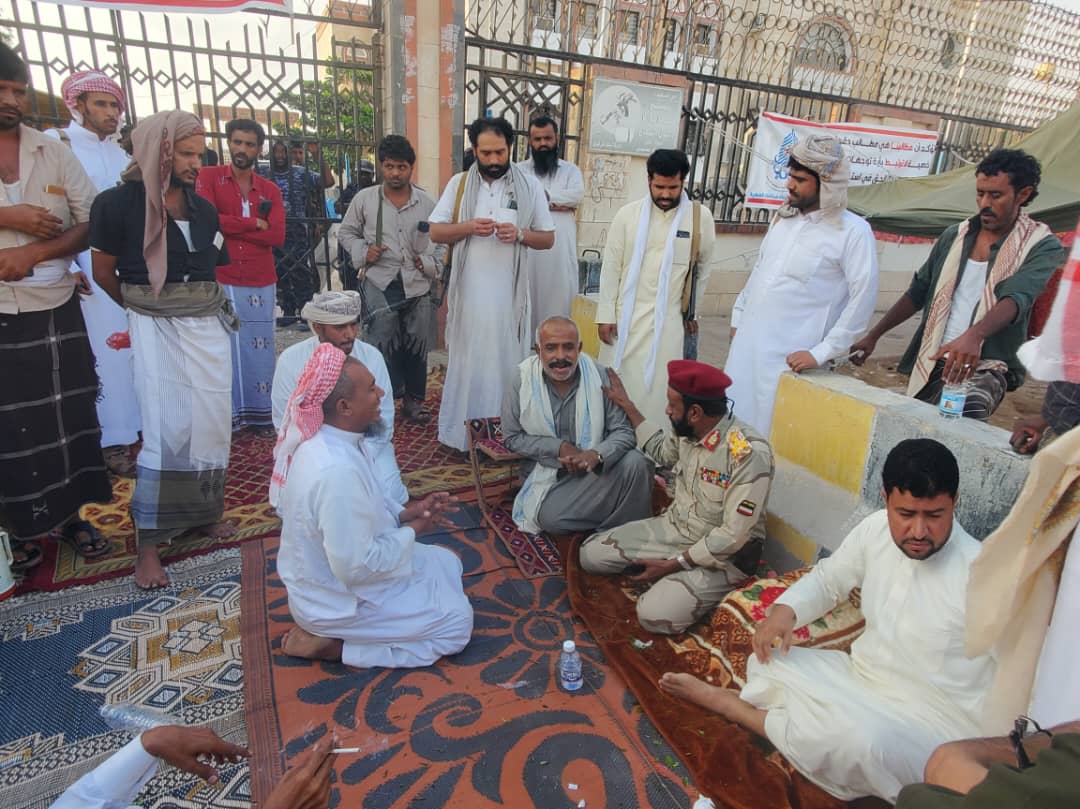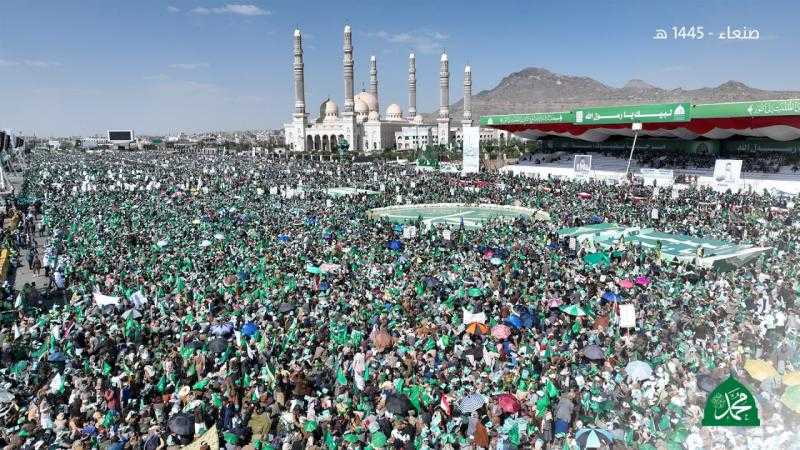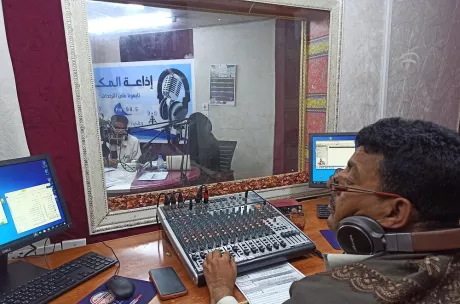|
|
اخبار محلية

اخبار اليمن The Prophet’s birthday between the paganism of the family and projects of earning money

As part of its efforts to sectarianize Yemeni society and build an aura of holiness around itself, Iran’s arm is working to exploit the Prophet’s birth, politicize the name of the Prophet Muhammad, through its lineage discourse, and present it as a sectarian symbolism that is specific to him and not other Yemenis who have found themselves facing a racist group that claims the divine right to guardianship over the people and ruling the country with iron and fire. In addition to its ideological dimensions through which the militia seeks to consolidate its sectarian presence and fuel what it considers class privilege at the social level, the Houthi group exploits the Prophet’s birthday, along with more than 17 sectarian occasions, as an annual season to make money and double illegal levies on citizens in areas under its control. Since its armed coup against the Yemeni government and its control of state institutions on September 21, 2014, Iran’s arm has worked to build a symbolic identity in the popular mentality of the communities in the areas under its control, reflecting the sectarian nature of the Houthi movement, such as reducing the prophetic identity to the green color with which it covers its areas of influence. Family idolatry While the terrorist Houthi gang seeks to divide the reality of Yemenis between ancestral class and hate speech, at the same time it exploits the occasion of the Prophet’s birthday as a political festival to promote its ideological discourse that presents the group as having the divine right to rule. In this context, political analyst and journalist Abdulwasea al-Fataki believes that the Houthi group is exploiting the occasion of the Prophet’s birthday as a political festival through which it wants to domesticate the Yemeni mentality with the idea of holiness and dynastic immunity. He added: "Therefore, the Houthi movement claims infallibility and holiness for itself, and wants the Yemenis to submit to their rule, obey them, and submit to their dictates, deprived of rights, deprived of their dignity, completely submissive to them." He continued: "The Houthis want to portray the Prophet Muhammad and the message of Islam, as if it were exclusive to them, and to transform the Prophet from a prophet for all of humanity, into the ancestor of a family who came to inherit rule and authority for it, to the exclusion of other Muslims." He pointed out that "the Prophet's birthday and many other sectarian occasions were invented by the group to impose its dynastic project, or in other words to ideologize the Yemeni mentality on a new heritage and a new doctrinal idea that it imported from Iran and is currently working to implement in Yemen." He added: "There is a Houthi attempt to create a political symbolic identity for religious vocabulary, such as greening everything that expresses the Prophet. It seems more like the process of creating a certain perception about the Prophetic identity and normalizing society on it and then monopolizing it within the group and its dynastic project." He concluded by saying: “All these activities and occasions of a religious nature, through which the militia seeks to build its political model in the Iranian style, do not represent Islam, but rather are a reflection of the ambition of a dynastic group and a well-known racist discourse, which is what the Houthi group and the rest of the factions of the Guardianship of the Jurist in Lebanon, Syria and Iraq embody and its main stronghold is Tehran. Profitable season Huge amounts of money are earned by Iran annually from its celebration of the so-called Prophet’s birthday, as the rebel group imposes fees and levies on various merchants and businessmen to finance its activities, in addition to what it imposes on all other people individually in areas under its control. In general, the sectarian events created by the Houthi group generate billions in amounts from its coffers and the pockets of its influential people, but what the militia earns under the pretext of the Prophet’s birthday exceeds what it collects on any other occasion as it harnesses its full potential and may reach the point of repression against anyone who refuses to provide the money decided upon for this day. In this context, journalist Salah Al-Jundi says: “The Houthi group is keen to exploit the day of the Prophet’s birth to make huge sums of money, under the name of celebrating the birthday, which it has turned into a season for collecting taxes and making money.” Speaking to NewsYemen, Al-Jundi added: “What the group collects under the pretext of celebrating this day goes into the pockets of its leaders, while a small part of it goes into painting the streets green or holding some sectarian events in schools or public squares.” He continued: "This group only cares about the Prophet as a grandfather, or as a source to fuel its corruption and earn some money from the pockets of the Yemenis against their will. Otherwise, this absurd militia cannot represent the Prophet in any way." He pointed out that the Houthis, who are spending millions of dollars today to paint the streets green, are the same ones who complain about poverty and destitution and refuse to pay the salaries of state employees in areas under their control, while they seize everything that can generate money, in addition to imposing illegal fees and levies.
مشاهدة اخبار اليمن The Prophet’s birthday between the paganism of the family and projects of earning money
يذكر بـأن الموضوع التابع لـ اخبار اليمن The Prophet’s birthday between the paganism of the family and projects of earning money قد تم نشرة ومتواجد على نيوز يمن وقد قام فريق التحرير في مصادر 24 بالتاكد منه وربما تم التعديل علية وربما قد يكون تم نقله بالكامل اوالاقتباس منه ويمكنك قراءة ومتابعة مستجدادت هذا الخبر او الموضوع من مصدره الاساسي.
 اخبار اليمن اتحاد المقاولين بالمهرة يواصل اعتصامه المفتوح لليوم الثامن ويحذر السلطات من تجاهل مطالبه الحقوقية والعادلة والمشروعة
اخبار اليمن اتحاد المقاولين بالمهرة يواصل اعتصامه المفتوح لليوم الثامن ويحذر السلطات من تجاهل مطالبه الحقوقية والعادلة والمشروعة اخبار اليمن بمناسبة ذكرى تأسيسها.. المقاومة الوطنية تكرم الدفعة الثالثة من منتسبيها
اخبار اليمن بمناسبة ذكرى تأسيسها.. المقاومة الوطنية تكرم الدفعة الثالثة من منتسبيها اخبار اليمن المليشيا تتكتم عن عدد ضحايا احتفالها بالمولد النبوي
اخبار اليمن المليشيا تتكتم عن عدد ضحايا احتفالها بالمولد النبوي اخبار اليمن إذاعتا المكلا وسيئون تحتفلان بعيدهما الـ56 والـ50
اخبار اليمن إذاعتا المكلا وسيئون تحتفلان بعيدهما الـ56 والـ50 اخبار اليمن عقوبات أمريكية جديدة على 7 شركات وشخصيات زودت مليشيا الحوثي بمحركات للطائرات
اخبار اليمن عقوبات أمريكية جديدة على 7 شركات وشخصيات زودت مليشيا الحوثي بمحركات للطائرات